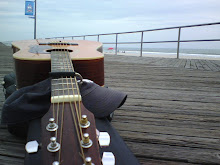Wednesday, April 30, 2008
Tuesday, April 29, 2008
Monday, April 28, 2008
Sunday, April 27, 2008
Saturday, April 26, 2008
Thursday, April 24, 2008
Wednesday, April 23, 2008
Monday, April 21, 2008
Sunday, April 20, 2008
Saturday, April 19, 2008
Friday, April 18, 2008
Thursday, April 17, 2008
Wednesday, April 16, 2008
Tuesday, April 15, 2008
Monday, April 14, 2008
Sunday, April 13, 2008
Saturday, April 12, 2008
Friday, April 11, 2008
Wednesday, April 09, 2008
Tuesday, April 08, 2008
Monday, April 07, 2008
Sunday, April 06, 2008
Saturday, April 05, 2008
Friday, April 04, 2008
Paul Pena
Paul Pena (January 26, 1950, Hyannis, Massachusetts – October 1, 2005, San Francisco) was an American singer, songwriter and guitarist.
His music touched on Delta blues, jazz, morna, flamenco, folk, rock and roll and Tuvan throat-singing. Pena is probably best known for writing the song "Jet Airliner," a major 1977 hit for the Steve Miller Band and a staple of classic rock radio, and for appearing in the 1999 documentary film Genghis Blues.
.
Thursday, April 03, 2008
Tuesday, April 01, 2008
Nusrat Fateh Ali Khan
Nusrat was responsible for the modern evolution of qawwali. Although not the first to do so, he popularized the blending of khayal singing and techniques with qawwali. This in short took the form of improvised solos during the songs using the sargam technique, in which the performer sings the names of the notes he is singing (for example, in western notation it would be "do re mi"). He also attempted to blend qawwali music with more western styles such as techno.
Nusrat's qawwali songs usually follow the standard form. A song begins with a short instrumental prelude played on the harmonium and tabla. Then the instruments stop, and the main singers (but not the chorus) launch into the alap, which establishes the raga, the tonal structure of the song. At this point, introductory poetic verses are sung. These are usually drawn not from the main song, but from other thematically related songs. The melody is improvised within the structure of the raga. For example, listen to the verses being sung in a relatively straightforward way in one performance (listen here). Now compare this to the same verses being sung in another performance with more improvisation.
After the introductory verses, the main song starts, and the rhythmic portion of the song begins. The tabla and dholak begin to play, and the chorus aids and abets percussion by clapping their hands. The song proceeds in a call and response format. The same song may be sung quite differently by different groups. The lyrics will be essentially the same, but the melody can differ depending on which gharana or lineage the group belongs to. As is traditional in qawwali, Nusrat and the side-singers will interject alap solos (listen here), and fragments of other poems or even improvised lyrics (listen here). A song usually has two or three sets of refrains, which can be compared to the verse chorus structure found in western music. Songs last about 20 minutes on average, with a few lasting an hour or more.
Nusrat was noted for introducing other forms of improvisation into the style. From his classical music training, he would interject much more complex alap improvisations, with more vibrato and note bending (listen here). He would also interject sargam improvisations.
While it is undoubtedly difficult to put into words what makes Nusrat's music appeal so deeply to so many listeners, many of whom do not understand a single word of the languages he sings in, here is one fan's attempt to explain: "Nusrat's music invites us to eavesdrop on a man communing with his God, ever so eloquently. He makes the act of singing a passionate offering to God. But we do not merely eavesdrop. The deepest part of Nusrat's magic lies in the fact that he is able to bring our hearts to resonate with the music, so deeply, that we ourselves become full partners in that offering. He sings to God, and by listening, we also sing to God."
.

